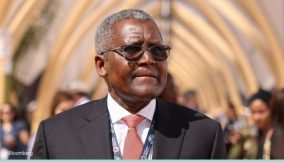The presence of the officials of Department of States Services, (DSS) at the Murtala Muhammed International Airport (MMIA) Lagos, recently has worsened the movement and facilitation of passengers at the airport terminal, BusinessDay has gathered.
Passengers who spoke to BusinessDay said the conspicuous presence of the secret police at the airport makes them apprehensive.
Passengers who have had to face multiple check points from airport security officials, the police and immigration are again faced with another long queue at the DSS check point which slows down movement.
“First you line up for DSS, and then you go to another line for immigration. Why are we always not progressive,” Stella Igwe, a disgruntled passenger told BuisnessDay.
Tommy Bakare, another passenger who narrated his experience told BusinessDay that the moment he was told that the DSS were checking and profiling passengers, he became apprehensive.
“I am only a passenger who wants to fly. I shouldn’t have any business with DSS. How come there are DSS everywhere at the airport? The airport should be a place where passengers should have a pleasant travel experience. The presence of DSS only makes people very self conscious and uncomfortable. This doesn’t happen anywhere else in the world,” Bakare said.
For Alex Njoku, another passenger who travelled through MMIA on Sunday, the presence of DSS worsens passenger movements, which was already slow as a result of multiple checks.
Read also: Why govt should prioritise vocational skills – NECA
Njoku said before now, passenger movements was already slow as a result of multiple checks at the terminal, adding that the DSS only makes things worse.
“There are lots of time wasting at the airport now. There are at least four lines just to stamp your passport. First line, you check in and get a boarding pass. Second line, you show your ID and scan your boarding pass, then go to another line to clear with security and then leave that line and join another line to get your passport stamped.
“After these four lines, you get on a line to scan your carry on, then pass through the metal detector and then go through body search. You go the departure area where you get on a line to board and your body is searched again, then you get your hand luggage hand searched. You get on a line to board, show your ID card again, then pass through to get on a line to enter the aircraft,” he explained.
He said the check in process takes over half an hour depending on the flight and destination.
According to him, ID check and board pass check take about 15 minutes depending on the time of day, security check takes about 15 minutes depending on the number of people and time of day, immigration and the National Drug Law Enforcement Agency (NDLEA) also take some time.
Olumide Ohunayo, an aviation analyst told BusinessDay that the presence of the DSS at the airport to check passengers is irritating, absurd and has nothing to do with modern day technology and the ease of doing business.
“I expect that the new administration will improve ease of doing business. We are not in a police state and we are not experiencing war to warrant such heightened security which terrifies passengers and make them uncomfortable.
“This can also make tourists not stop over in Nigeria. It should be looked into. Security personnel are available in almost all airports all over the world but they are never seen except for those who have issues like Interpol, criminal issues,” Ohunayo said.
He said on Monday he was surprised to see that passengers were queuing up to be checked by DSS, adding that this is not right.
“The DSS can share intelligence and collaborate with every other organisations. This means there should be more profiling that should have been done before the aircraft takes off. If after stamping the passports, there are need for any other checks, they can take it up from there,” he suggested.
John Ojikutu, member of aviation industry think tank group, Aviation Round Table and chief executive of Centurion Securities however said the DSS has always been in the airport security defence layers and indeed in the first layer which is intelligence (Government security agencies).
Others he mentioned are passenger- prescreening and check-in (airlines responsibility), airport access control, checkpoint screening (immigration and DSS), hold baggage screening (airlines) and on-board security (airline/government security agencies).
Ojikutu said this first layer should necessarily be outside the airport (government security agencies) except the other layers are weak or are compromised.
He said multiple security agencies that are not networking in the airport and with no unified control can give room for insider threats and these could be serious threat to the national security.
“Airports are national assets of national security and are therefore targets for attacks to homegrown and international terrorists,” he said.
“The presence of the DSS is talking loud to us that there is need for the security of the airports to be taking to a higher level than it is. My question is : are the other security agencies carried along? I hope they are. Otherwise, you are likely to be hearing discordant tunes in the airport security.”
He explained that if intelligence tells the DSS that there are gaps in the national line of defence, it is not unusual to find the responsible security agencies around.
“I agree that there are many Security agencies in the airport that must be reduced, but powerful political appointees heading these security agencies have made it difficult for change,” he said.
Join BusinessDay whatsapp Channel, to stay up to date
Open In Whatsapp





